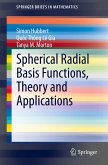Please note that the content of this book primarily consists of articles available from Wikipedia or other free sources online. In mathematics, a radial function is a function defined on a Euclidean space Rn whose value at each point depends only on the distance between that point and the origin. For example, a radial function in two dimensions has the form Phi(x,y) = varphi(r), quad r = sqrt{x^2+y^2} where is a function of a single non-negative real variable. Radial functions are contrasted with spherical functions, and indeed any decent function on Euclidean space can be decomposed into a series consisting of radial and spherical parts: the solid spherical harmonic expansion. A function is radial if and only if it is invariant under all rotations leaving the origin fixed. That is, is radial if and only if fcirc rho = f, for all SO(n), the special orthogonal group in n dimensions. This characterization of radial functions makes it possible also to define radial distributions. These are distributions S on Rn such that S[phi] = S[varphicircrho] for every test function and rotation .







